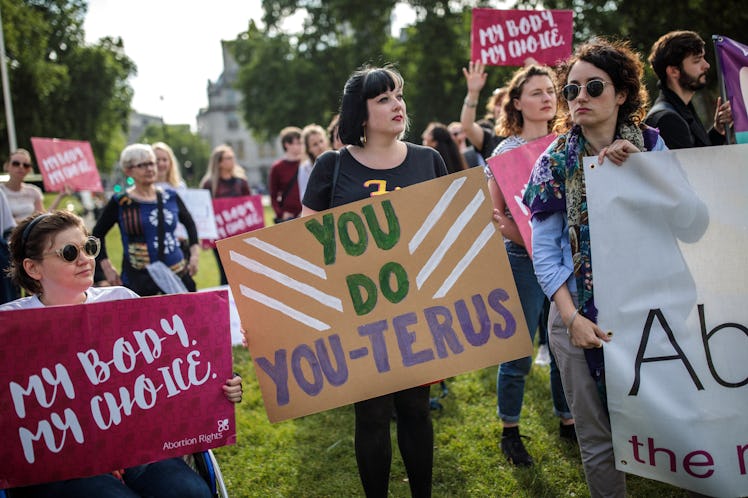
These States Would Be Abortion Havens If Roe Falls
You’ll have legal protections.
It's a scary time for Americans with a uterus. As the Supreme Court weighs a likely overturn on Roe v. Wade, states like Alabama, Georgia, and Missouri continue to crank out some of the country's most restrictive abortion laws. But while some anti-choice legislators are working hard to chip away at reproductive rights, others are working even harder to protect them. These 16 states' laws protect abortion, in case worse comes to worse, which is unfortunately looking extremely likely.
It's an important topic, considering that on May 2, a draft opinion in the Supreme Court’s case, Dobbs v. Jackson Women’s Health Organization, was leaked to Politico. The draft, written by Justice Samuel Alito, suggested the court would overturn the national right to abortion – affirmed in 1973’s landmark case Roe v. Wade – in a decisive majority opinion. In the draft opinion, Alito claimed “Roe was egregiously wrong from the start,” and added, “It is time to heed the Constitution and return the issue of abortion to the people’s elected representatives.” On May 3, the Supreme Court verified the draft’s authenticity, but said that the decision was not final. The court is expected to make their final ruling on the case in June.
With the conservative-majority court’s ultimate decision looming, the whole country is on edge: If Roe is indeed overturned, abortion access will become heavily restricted across nearly half the nation. As of June 2022, 13 states have "trigger laws" in place that would immediately ban abortion, while nine more states have restrictions that are currently blocked by Roe, but could go into effect if it’s overturned. However, other states have laws in place that protect the right to abortion.
According to the reproductive rights think tank the Guttmacher Institute, as of June 1 there are 16 states, plus Washington D.C., with laws protecting abortion rights in effect. They include California, Colorado, Connecticut, Delaware, Hawaii, Illinois, Maine, Maryland, Massachusetts, Nevada, New Jersey, New York, Oregon, Rhode Island, Vermont, and Washington (plus Washington D.C.). Colorado, DC, New Jersey, Oregon, and Vermont are the only ones to protect the right to abortion throughout the entire pregnancy, while the other states protect the right to an abortion up until viability, meaning when the fetus can survive outside the womb, or when necessary to protect the mother's life or health. These laws are all separate from the federal right to an abortion protected under Roe — meaning that should Roe be overturned, people in these 16 states (and D.C.) would still have the right to an abortion, as well as anyone who can travel there for care.
Some states are taking it further. Ahead of the Supreme Court’s decision, New York has taken measures to bolster its reproductive health protections through a “comprehensive six-bill package” that encourages people in need of abortion to travel to New York for care, and prevents legal retaliation against patients and providers alike. “Reproductive rights are human rights, and today we are signing landmark legislation to further protect them and all who wish to access them in New York State,” Gov. Kathy Hochul said in a June 13 statement following the signing of the package. “We are taking action to protect our service providers from the retaliatory actions of anti-abortion states and ensure that New York will always be a safe harbor for those seeking reproductive healthcare.”
State actions will be all the more important should the Supreme Court officially overturn Roe. On a federal level, congressional legislators have failed to pass legislation codifying abortion rights: Most recently, The Women’s Health Protection Act, which would “protect a person’s ability to determine whether to continue or end a pregnancy, and to protect a health care provider’s ability to provide abortion services,” failed in the Senate in February 2022.
Things may look bleak, but it's not over yet. In the meantime, if you're worried about your rights, you can always take action to help with a donation or other activism. Remember: anything helps.
The Supreme Court is expected to release their official decision in Dobbs in late June or early July.
This article was originally published on